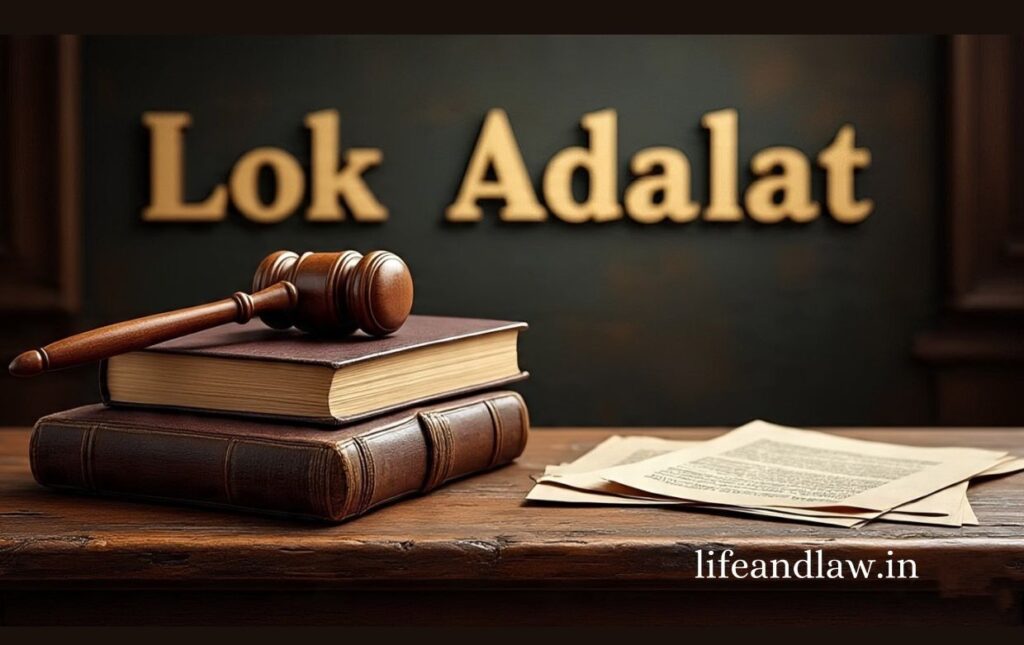Trending

In India, where over 5 crore cases are pending in various courts, obtaining speedy justice remains a huge difficulty. The principles of economical and swift justice frequently meet with procedural delays, hefty legal fees, and restricted reach, particularly in rural communities. To solve this, the legal system has adopted Alternative Dispute Resolution (ADR) approaches, including National Lok Adalat, which has developed as a valuable tool for speedy and peaceful conflict resolution.
This article delves into how National Lok Adalat operates as a citizen-centric program that decentralises justice delivery. It emphasises its structure, benefits, current improvements, and real-world influence on making justice more accessible at the grassroots level.
While Lok Adalats are held on a regular basis at various court levels, the National Lok Adalat is a one-of-a-kind program in which issues are settled across the country on a single scheduled day, which is approximately held four times a year.
These Adalats, organised by the National Legal Services Authority (NALSA) and corresponding State Legal Services Authorities (SLSAs), take place in courts ranging from the Supreme Court to Taluka-level benches. Its uniqueness stems not only from its size, but also from its coordinated approach. Pre-identified instances that can be settled amicably are given precedence.
Unlike traditional courts, there is no requirement for professional legal representation, and the emphasis is on settling conflicts by compromise and consensus. If a settlement is made, the decision is legally binding and enforceable, similar to a civil court decree.
While the ideals of voluntariness, rapidity, and informality are well-known, the behind-the-scenes effort that goes into organising National Lok Adalats is frequently underestimated:
• Case pre-screening: A list of suitable cases is prepared in advance, including civil, bank recovery, traffic challans, insurance claims, divorce disputes, and compoundable criminal charges.
• Bench formation: Each Lok Adalat bench is composed of a sitting or retired judge, a legal practitioner, and a community/social worker.
• Public awareness campaigns: Legal Services Authorities frequently hold camps, radio announcements, and village meetings to notify locals of forthcoming sessions.
• Settlement talks: Parties are urged to negotiate with conciliators. If a compromise is achieved, the award will be signed and sealed on the same day.
Beyond the numbers, National Lok Adalat offers critical structural and social benefits:
• Judicial relief: Reduces pressure on overcrowded courts by resolving a large number of small issues.
• Empowers citizens: Particularly important for those from economically disadvantaged backgrounds who may lack the resources to pursue formal legal remedies.
• Promotes reconciliation: Lok Adalats are frequently used as a healing venue for parties involved in family problems to speak openly and reach an amicable resolution.
• Time and cost savings: There are no legal fees, lengthy procedures, or appeals, allowing parties to get on with their lives swiftly.
• Promotes legal literacy: The process frequently educates people about their legal rights, fostering a culture of resolution over litigation.
Despite its successes, National Lok Adalat confronts a number of practical and ethical challenges:
• Superficial Settlements: In order to fulfil disposal targets, some compromises may not be fair or totally consensual.
• Limited scope: Serious criminal cases and non-compoundable offences are excluded. Furthermore, not all legal issues are amenable to settlement.
• Enforcement gaps: Implementing agreed-upon agreements, particularly in non-monetary settlements (such as property disputes), can be difficult without additional legal options.
• Lack of uniform quality: While some states have highly effective Lok Adalat processes, others lag owing to inexperienced workers or logistical issues.
• Language and literacy barriers: Participants from tribal or distant places may have difficulty understanding the legal process, especially in informal settings.
To reach its full potential, the Lok Adalat system—particularly at the national level—must improve in the following ways:
• Digital Expansion: Continue to integrate online processes for registration, hearing, and document verification.
• Community Partnerships: Collaborate with NGOs and local organisations to improve outreach and support for first-time litigants.
• Training Program: Provide conciliators and panellists with soft skills training in mediation, negotiation, and cultural sensitivity.
• Awareness campaigns: Use the media to foster trust and educate people on how to access Lok Adalats and their rights.
A growing trend is the active participation of law students and young legal professionals as volunteers and observers at National Lok Adalats. Many law schools now urge students to help with legal awareness campaigns and administrative responsibilities, giving them real-world experience in dispute settlement. This not only helps Lok Adalats work, but also produces a new generation of advocates for accessible and people-friendly justice delivery.
National Lok Adalat is more than just a legal initiative; it is an effort to make justice more inclusive, efficient, and people-centered. It provides a practical answer to India’s overcrowded judicial system, empowering citizens with speedier and more accessible conflict resolution.
This article is authorised by Adv. Abdul Mulla, a practicing advocate and the founder of www.asmlegalservices and the legal knowledgeable website www.lifeandlaw.in. He hopes that his work will raise legal awareness and make justice more accessible to everyone, particularly those who are outside of the formal court system.
Adv. Abdul Mulla (Mob. No. 937 007 2022) is a seasoned legal professional with over 18 years of experience in advocacy, specializing in diverse areas of law, including Real Estate and Property Law, Matrimonial and Divorce Matters, Litigation and Dispute Resolution, and Will and Succession Planning. read more….
Copyright BlazeThemes. 2025